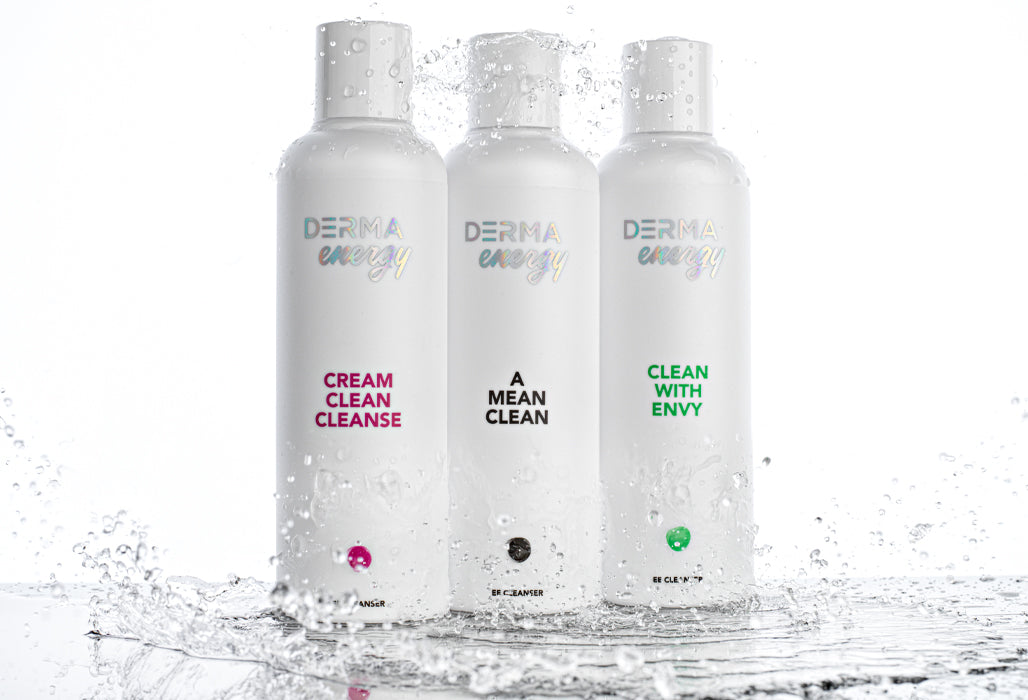
Sulfates, sulphates, sodium lauryl and laureth… If you’re ever picked up a bottle of shampoo, facial cleanser or body wash at the supermarket, you’d be familiar with these terms. But what exactly are sulfates, why are they so prevalent in personal care products, and should you be avoiding them? Here’s the fact, the fiction, and everything else you need to know.
What are sulfates?
We won’t get too grade 10 Chem lab here with talk of polyatomic ions and tetrahedral structures (you’re welcome). Instead, we’ll keep things simple and tell you that sulfates (or sulphates in British English) are synthetic ingredients that are essentially surfactants or detergents.
In cosmetics, a surfactant is an ingredient that is compatible with both oil and water. It usually consists of both hydrophilic (water loving) and hydrophobic (oil loving) components. This allows it to provide a cleansing effect by lifting dirt and oil and washing it down the drain along with your cleanser/ shampoo.
Sulfates commonly used in skincare products include:
- sodium lauryl sulfate (SLS)
- ammonium lauryl sulfate (ALS)
- sodium laureth sulfate (SLES)
Seen them? Of course you have. When we say commonly used, we mean it—sulfates are the beauty industry’s most commonly used detergent.
Why are sulfates used in skincare and shampoos?
You know that lovely lather and mountain of suds you get from your favourite shampoo? Or that super-fresh and pleasantly ‘tight’ sensation you get from using a foaming gel cleanser? That’s sulfates at work.
Sulfates are an incredibly popular cosmetic ingredient because they are a cheap and convenient way to create bubbles, lather and cut through grease, oil and dirt. And, for better or worse, consumers tend to love that squeaky-clean sensation.
Are sulfates bad for the skin?
While sulfates are considered safe, some people find them sensitising and they may lead to eye, skin and scalp irritation. When used in high concentrations, sodium lauryl sulfate in particular has a bad rep for causing dryness and sensitivity.
In haircare products, sulfates can do TOO good a job of cleansing, removing natural oils and fading colour. Similarly, sulfates in skincare can be too harsh and stripping, diminishing the skin barrier and leading to irritation, discomfort and, in some cases, breakouts.
“Sulfates are commonly used in facial cleansers as they are affordable, easy to use, stable with many other ingredients (so less of a formulating challenge), and able to creates lots of foam. They are, however, very harsh on the skin and strip the skin of its natural sebum layers in addition to excess oil and dirt,” says Dermaenergy’s formulating chemist.
“This is a problem not just for dry and sensitive skin types, but also those with oily and acne-prone skin. If the skin is over-cleansed it reacts by producing even more oil on the surface which is a major problem for acneic skin types who believe they need a really strong cleanser.”
Does DermaEnergy use sulfates in its cleansers?
Dermaenergy DOES NOT use sulfates in its cleansers. Why? We want to cleanse the skin in the most effective yet gentle way possible, without irritating the skin or removing its natural (and healthy!) sebum layer.
How hard is it to create a sulfate-free cleanser?
It’s definitely not easy. As our chemist explains: “It’s difficult to create a sulfate-free cleanser as there are less naturally derived surfactants available that allow the creation of stable gels or cleansing formulas. The most difficult challenge of a sulfate-free cleanser is trying to thicken a formula and keep the texture in a usable format.
“Most naturally derived surfactants also foam less in comparison to a sulfate-based surfactant. While this is not necessarily a measure of how well a product cleanses, it is important for consumers to feel like a product is cleansing.”
Dermaenergy’s sulfate-free solution
Due to these challenges, it took a long time to formulate our sulfate-free facial cleansers, Clean With Envy (all skin types) and A Mean Clean (ideal for non-sensitive, acne-prone or ageing skin). However, we’re incredibly proud of the results! The unique mixture of surfactants that Dermaenergy uses cleanses effectively, foams richly (foams for days) and caresses the skin so it’s not too harsh or drying.
